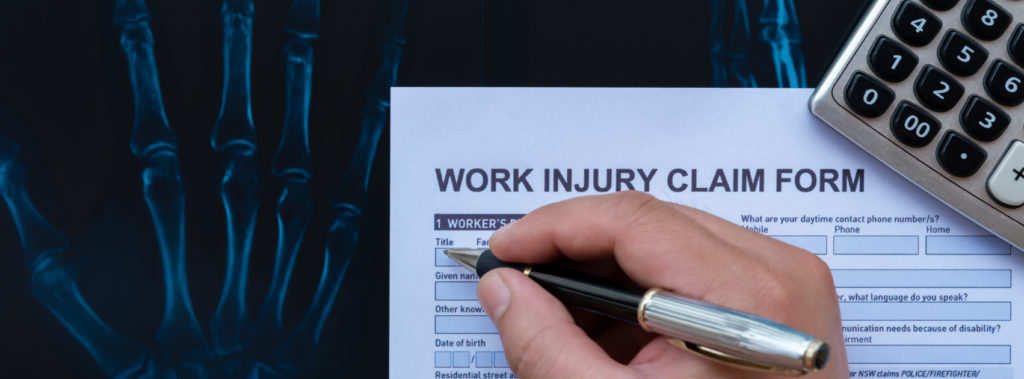
Work-related injuries can be detrimental to someone’s livelihood. If you ever find yourself hurt at work, it is important to understand your rights as a worker. The first thing many employees find themselves wondering is, “am I suing my employer?” No! You are not. Workers’ compensation is a no-fault system where you are going after the insurance that is already available for you to claim. We want to help you avoid the common mistakes made after a job injury. Being injured on the job doesn’t have to be a difficult process!
A workers’ compensation lawyer is there to assist you in getting your life back to normal.
What Qualifies as a Work-Related Injury?
Common work-related injuries include:
- Heart Attack and Stroke
- Slip and Fall
- Back and Neck
- Cumulative Trauma – such as carpal tunnel syndrome
- Communicable Diseases – such as COVID-19 (only certain states), TB or other infectious sources
- Occupational Exposure – such as hearing loss, asthma, and lung disease
- Assault – such as being struck or physically attacked by co-workers or customers
- Auto Accident – driving between work sites or performing work-related errands
It is necessary to report all types of injuries that occur at the workplace to your supervisor. Always be sure the accident is documented in writing and documented correctly. Filling out a workers’ compensation report in a timely manner is important if you want to be compensated for your injuries. Letting time go by as you suffer from your work-related injuries will hurt you in more ways than one and not affect your employer at all.
What are my Rights if I Get Hurt on the Job?
You should never let your employer convince you NOT to fill out a workers’ compensation claim. Work-related injuries should never go undocumented, it will only hurt you not your employer. Each state has a different statute of limitations for filing a workers’ compensation claim while also having different requirements. It is important to familiarize yourself with your state’s statute of limitations for workers’ compensation claims, just in case you ever find yourself hurt at work.
Some states statute of limitations:
- Florida → File within 2 years of accident or 1 year after the last date of receiving benefits.
- Tennessee → Fill out Form C40B within 1 year of the incident date
- Arizona → File within 1 year from the incident date
- New York → Within 2 years from the incident date or last payment of compensation, whichever is later
- Wisconsin → Within 2 years from the incident date, within 12 years if the employer knew about the injury and there is no statute of limitations for occupational disease and certain traumatic injuries
- Kansas → 200 days from incident date or within 200 days after last payment or benefits
If you decide to file a workers’ compensation claim, it is crucial for you to document everything. Documenting all of your days off from work, dates of medical treatment, round trip mileage for doctor appointments, and receipts for all out-of-pocket medical and prescription costs. All of these points will make for a great case if you decide to need an attorney by your side to get the compensation you deserve!
Getting better is your main goal when recovering from a work-related injury. It is important for you to be able to go to work when you are physically able. Refusal to work and still seek compensation after being cleared by your doctor could result in you losing compensation. Even if you have been cleared by your doctor and you feel like you wouldn’t be able to complete your position’s requirements, as long as you can prove it, your employer will offer you another position with similar compensation. If the compensation for the new position pays less than 80% of your previous job, you are entitled to a wage loss benefit from your insurance carrier to make up the difference.
 COVID-19 and Workers’ Compensation Claims
COVID-19 and Workers’ Compensation Claims
With the ongoing pandemic of COVID-19, many workers wonder what would happen if they had a work-related illness that was due to someone who spread it throughout the workplace. The National Council on Compensation Insurance has addressed so many questions that employees have when it comes to COVID related workers’ compensation claims.
Some major points we would like to highlight are as follows:
- Even though workers’ compensation laws allow for compensation when related to “occupational diseases” that can occur within or out of the workplace, it seems that many states do not include “ordinary diseases of life” meaning colds and flus.
- Whether or not COVID-19 falls into that category, you would have to look into your specific state laws for workers’ compensation.
- If there was a COVID-19 contamination at a job site, the employers must provide for proper cleaning/disinfecting to remove contamination.
- Code 9014 means the employer is wiping down the surfaces.
- Code 5473 means operations are using sheeting and air filtration equipment in order to clean contamination.
- Addressing the Families First Coronavirus Response Act, it doesn’t necessarily apply to workers’ compensation. The Act passed in order to expand food assistance, address unemployment benefits and provide emergency paid sick leave and medical leave if needed.
When filing for a workers’ compensation claim for any kind of work-related injury, knowing the laws of your specific state will help you achieve the best compensation necessary. It is important to remember that you cannot get fired for filing a workers’ compensation claim. You are going after your employer’s insurance, not the employer directly. You shouldn’t be afraid of your employer, especially after getting hurt at work. A workers’ compensation lawyer can be that heavy hitter when you feel small fighting against your employer’s insurance alone.

 COVID-19 and Workers’ Compensation Claims
COVID-19 and Workers’ Compensation Claims